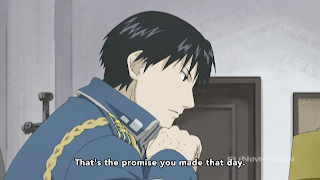Ani-Gamers staff writer Ink contributes a weekly column in which he examines the differences between the original Fullmetal Alchemist and its re-telling, Fullmetal Alchemist: Brotherhood. To read previous entries, click here.
Watch Episode 31 – The 520 Cens Promise
This episode follows the theme of transition, more specifically making the best of a bad situation. Starting with Hawkeye as Fuhrer’s assistant, we learn that position does not determine behavior. Keep your friends close and enemies closer is the credo, but Hawkeye makes it known that proximity does not beget obedience and that the Fuhrer should sleep with his eyes open.
Along the same vein, Mustang, a man without allies (they’ve all been reassigned to other headquarters), portrays himself as a king estranged from his league of loyal chess pieces. Lest the bluntness be lost, remember Wrath currently holds the title of Fuhrer King, the title which Mustang longs to usurp. Facing the loss of all those that lent their support to his ambitions, Mustang does the only thing he can: calls in a favor and starts to build new alliances.
Speaking of Mustang, I’m liking the fact that the director takes every opportunity to showcase the scar on Mustang’s hand (injured in a battle with Lust). It is prominently featured on most close ups, usually the nearest bare hand to camera and serves as a reminder of his fallibility and mortality. This is more than a typical badge of courage; it is a memory and constant reminder of a wound. Unfortunately, this heavy reminder looks like a bit of badly drawn hair. FMA1’s infallible Mustang left it to his soldiers to take the hits that left marks, once even telling Hawkeye, coldly, to clean the blood off of her forehead (grazed by a rock) because it looked undignified. Because FMA2’s Mustang has suffered, it makes him more human than the FMA1 version, more prone to error, and thus creates a good, believable tension for any scene where action is involved.
There is also some more Kimblee back-story, mostly regarding his military-sanctioned use of a real philosopher’s stone, as well as his current release from military prison by the homunculi. In FMA1, Kimblee was part of the military team that destroyed Ishval with the help of fake philosopher’s stones and then ended up in Lab 5 as an ingredient for a stone. But FMA2 grants him the power of a true philosopher’s stone and a special place in the homunculi’s hearts because of his disposition. This is similar to FMA1 only in that both Kimblees worked with homunculi. FMA1’s Kimblee worked with Greed and later the Armestris military (directed by Pride/Wrath), and FMA2’s worked with Envy – as messenger for Father and representative of the whole homunculi lot. But with former FMA2 episodes touting Homunculi Pride, how is their having to rely on a mere human going to play out with egos on both sides? It’s an interesting setup.
There’s also a lot to be said of FMA2’s portrayal of Scar. He’s intelligent and calculating, as opposed to FMA1’s over-zealous, revenge-bent mass murderer (with a heart of gold). Again, FMA2 chooses tactics over emotion while managing to imply the latter. What I’m talking about specifically is Scar’s treatment of Marcoh. Playing the doctor’s guilt to gain any insight possible into the Ishvalan War of Extermination, Scar performs a bit of impromptu (and incomplete) plastic surgery on Marcoh that serves to both exact a bit of cathartic revenge and hide the missing alchemist from the eyes of the military and homunculi alike. The act is shown with great force and an undeniable anger that is never spoken.

